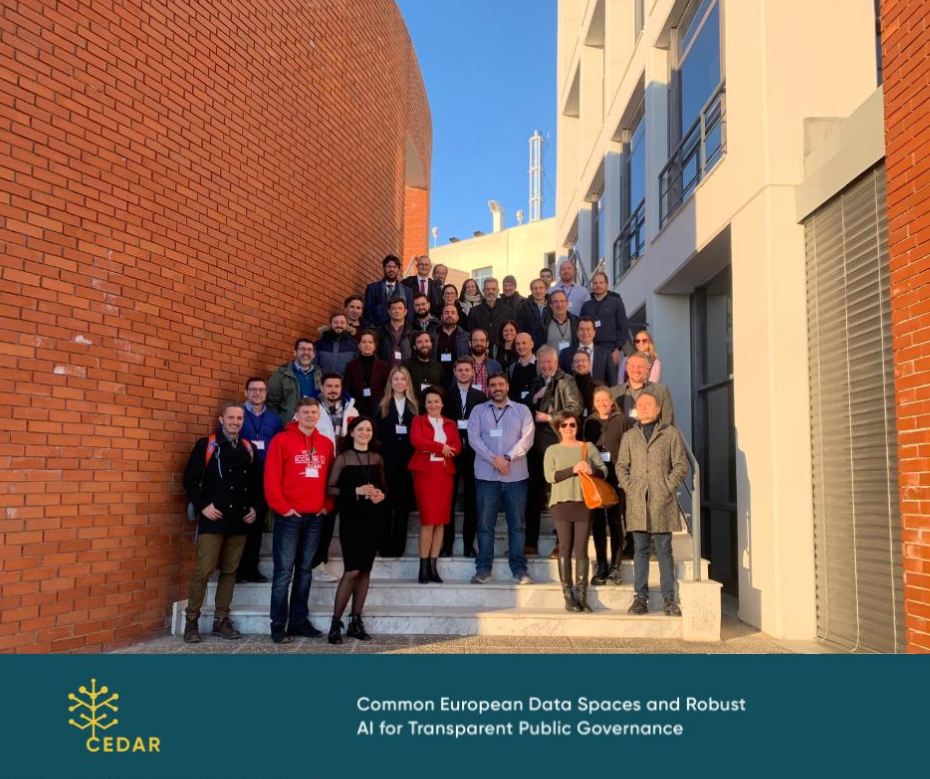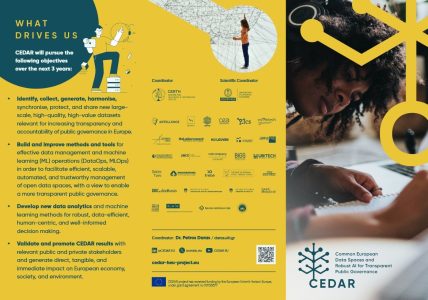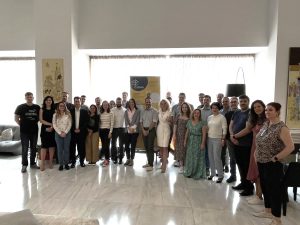CEDAR – Common European Data Spaces and Robust AI for Transparent Public Governance

Arthur's Legal is proudly introducing to you one of our latest European projects called CEDAR.
CEDAR will respond to the need for high-quality, high-value, analytics-ready and Open Data for transparent Public Governance to address the increasingly complex and evolving needs of data and users. In this consortium Arthur's Legal will help out on different fields within the project. In summary Arthur's legal will be monitoring the ethical and legal analysis, the scientific, technical and data management, help out with any requirements in formalization and consolidations, and it will consult activities to align the public and private data collections and synthetic data generation with ethics standards and relevant laws. Arthur's Legal will help out with all the pilot demo's by supporting all piloting activities within the requested domain expertise and last but not least, with the promotion and exploitation of CEDAR Science and Innovation. Arthur’s Legal will closely monitor the EU legal landscape, in particular focusing on data protection aspects and transparency requirements.

A team of nine top research institutions and universities, twelve technology and business developing companies, seven public sector end users, and three relevant NGOs is launching CEDAR, an initiative to promote more transparent and accountable public governance in Europe. By sharing high-quality datasets, developing secure connectors for European data repositories, and employing innovative technologies for efficient big data management and analysis, CEDAR aims to promote better evidence-based decision-making, combat corruption, and reduce fraud in public administration.
“The CEDAR project is an ambitious effort and a great opportunity to accelerate the digital transformation of audit mechanisms against the embezzlement of public funds and corruption. The Common European Data Spaces should be at the center of this endeavor.” - Dr. Petros Daras (Coordinator)

The consortium during the General Assembly in Athens '24
CEDAR will identify, collect, fuse, harmonise, protect, and share 10+ new high-quality datasets. This will involve digitising data from public administration archives and generating synthetic data to improve real-world data quality. The project also aims to harmonise and standardise different public and private data sources into new unified datasets. Furthermore, CEDAR seeks to enable fair and secure data access to these datasets and integrate them with 6+ Common European Data Spaces already existing in Europe.
This 36-month project will also focus on building and improving innovative data management and machine learning operations such as DataOps and MLOps. These operations are vital for ensuring effective, scalable, automated, and trustworthy data spaces, especially in the context of transparent public governance. CEDAR recognizes the deficiency of software and infrastructures for effective data management in public administration and aims to address this by adopting common architectures, standards, and technologies that ensure interoperability, reusability, portability, security, and privacy in data management and machine learning.
CEDAR will develop methods, tools, and guidelines to digitise, protect, and integrate data to address significant issues like corruption, aligning with the European Strategy for Data and the development of Common European Data Spaces (CEDS), and the European Data Act. This will lead to improved transparency and accountability in public governance, promoting European values and rights in the digital world, and enriching the European data ecosystem and economy.
Finally, CEDAR will test and promote its results with relevant public and private stakeholders, generating positive, tangible impacts on the European economy, society, and environment. It will validate the results in different pilots across three European countries, focusing on areas such as monitoring national RRP (Recovery and Resilience Plan) funds in Italy, transparent management of Slovenian public healthcare funds, and transparent management of foreign aid for rebuilding Ukraine.
Key Objectives of the CEDAR Project
CEDAR will develop methods, tools, guidelines for automated digitalisation of data sources existing in public administration’s, in the framework of the fight against corruption and fraudulent activities, and mainly in pursuit of the following four driving objectives:
- Identify, collect, generate, harmonise, synchronise, protect, and share new large-scale, high-quality, high-value datasets relevant for increasing transparency and accountability of public governance in Europe.
- Build and improve methods and tools for effective data management and machine learning (ML) operations (DataOps, MLOps) in order to facilitate efficient, scalable, automated, and trustworthy management of open data spaces, with a view to enable a more transparent public governance.
- Develop new data analytics and machine learning methods for robust, data-efficient, human-centric, and well-informed decision making.
- Validate and promote CEDAR results with relevant public and private stakeholders and generate direct, tangible, and immediate impact on European economy, society, and environment.
Key Results of the CEDAR project
- High-quality, high-value datasets and data models – Validation of new datasets and technologies in the context of fighting corruption, with a view to align with the EU strategic priorities on digitalisation, economy and democracy.
- Innovative & Scalable DataOps & MLOps technologies – Development and improvement of existing 1) DataOps technologies, including connectors for integrating novel data sources with existing CEDs (Common European Data Spaces), for effective, scalable, trustworthy, and interoperable data management that carry traceable information about the data origins and applied operations, and 2) MLOps technologies for efficient and trustworthy management and deployment of ML models and analytics pipelines.
- Robust Machine Learning & analytics models & algorithms – Development of robust algorithms to facilitate human-centric and evidence-based decision-making in public administration with the ultimate goal to obtain advanced data analytics and Machine Learning solutions that can combine vast amounts of data:
(1) from multiple sources (social media, news articles, financial statements, government registries and reports, and other sensors); (2) in different modalities (numbers, text, images, videos), and (3) incorporating different contexts. - Applications & user-centric dashboards – Production of Visualisation Dashboard & User-Centric Interfaces (UIs) to facilitate advanced decision making and to offer a high-level view of the most important insights as well as (2) detailed representations of the data points, highlighting connections, patterns, and trends.
- Know-how, best practices, Standardisation & Policy recommendations – Contribution to relevant Standardisation activities and European policy making, defining result-specific business models and business plans, and developing a sustainability roadmap.
- Co-creation & Pilot Studies - All project results will be co-created and piloted in a relevant setting with the end users, thereby enabling preparation of results for a real-world uptake across different communities and countries. Co-creation of the above-mentioned data and data technologies will involve 3 different pilots in 3 different countries (Italy, Slovenia and Ukraine), through which we will facilitate a more data-driven public sector and enable a more transparent public governance in Europe.
Please visit our LinkedIN page for the latest news, articles and more details.
If you would like to stay in the loop, please subscribe here to our newsletter and/or you can find out more information on: CEDAR EU.
Please reach out to us as well in order to liaise or if you would like to hear more about this exciting project.
